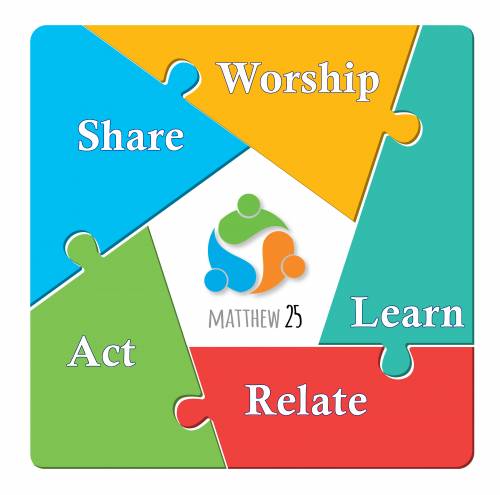So, you are now a Matthew 25 church! What’s next?
This video is also available in Spanish [Español] and Korean [한국어].
You may already be active and involved in anti-poverty, racial justice and/or church vitalizing ministries and already know the next steps you’ll take. We would love to hear how you are doing it. Share your stories here.
You may be looking for more ideas or a clear next step for your Matthew 25 ministry. If that is the case, adapt the following suggestions to get started on your journey.
- Choose a few people willing to be Matthew 25 guides or a team to keep the focus in front of your congregation or worshiping community.
- Evaluate your context to find a need in the community, and the partners with whom you could work in the community, as you assess your congregation’s gifts and strengths to offer. Ask questions such as: Who is in our neighborhood? How do we relate and reach out to them? What do community leaders say they desire from partners and advocates?
- Discern what feels right as a goal for your context, knowing there is no single or correct way to be a Matthew 25 church.
- Develop a plan to achieve your goal. Include all activities — when they will take place, who you hope to lead them and how an activity will help you achieve your desired goal.
- Assess annually how your ministry is unfolding and if you feel called to adapt or expand.
Possible Next Steps You Can Take with Matthew 25
(KEY: V= building congregational vitality, P= eradicating systemic poverty, R= dismantling structural racism)
- Advocate for just policies in the Farm Bill. It is an important national bill that will be discussed and voted on in 2023. It includes policies that can reduce poverty through child nutrition, WIC/SNAP benefits, school lunch and breakfast benefits, and supporting small and family farmers — but legislators need to hear from constituents who are asking for these nutrition, health and food security policies to be included and protected. (P)
- Offer your building space during the week to organizations in the community that are doing work to eradicate poverty and end racism. Organizations might offer after-school tutoring, job training, anti-racism classes, English Language Learner classes, community organizing or more. (P, R)
- Learn how the PC(USA) understands evangelism in the 8 Habits of Evangelism (8habits.org). (V)
- Choose three Sundays a year to focus your community’s worship on a Matthew 25 theme. In 2023, denomination-wide Sundays for these are Jan. 15 (Structural Racism), March 19 (Congregational Vitality) and Nov. 26 (Systemic Poverty). You can use those suggested dates or choose other Sundays that work for your church. Also, choose your own hymns/texts or see suggested worship resources and explore the Matthew 25 Bible study at presbyterianmission.org/ministries/matthew-25/matt-25-resources. (V)
- Find out who in your area leads Community Organizing efforts and join with them to address root causes of poverty, homelessness and structural racism. Many faith-based community organizations are working to create Affordable Housing Trust Funds in their areas. (P, R)
- Connect to your state chapter or the national level of the Poor People’s Campaign. They are building effective community and a national moral movement to end poverty, fight racism, stop militarism, support voting rights and combat climate change. Visit poorpeoplescampaign.org.(P, R)
- Give a financial gift to, or incorporate into your ongoing mission budget, an organization working on the root causes of poverty or racial justice, locally, nationally or globally. Invite leaders to speak to your congregation to share their work. (V, R, P)
- Think globally. How are ministries and organizations in other countries working to end poverty, dismantle oppression and revitalize the church? Explore global ministry stories and/or connect with PC(USA) mission co-workers, who serve alongside global partners, by reading their letters and committing to pray for them. Visit pcusa.org/missionconnections. (V)
- Work to end cash bail. Cash bail systems penalize those who are poor and disproportionately impacts people of color because cash bail only keeps people incarcerated if they cannot afford to post bail. For instance, anyone who can afford to post bail is then able to remain free until their case is decided. It is not related to the crime being charged but upon whether a person has money to afford bail or not. Meanwhile, being imprisoned while waiting for trial increases poverty because people can lose employment, custody of children and more. Visit bailproject.org (P, R)
- Partner and build relationship with another congregation, presbytery or group (either Matthew 25 and/or new immigrant worshiping communities) to learn and work together on common Matthew 25 ministry. (V)
For more information
- Contact your Ministry Engagement Advisor. MEAs are willing to do in-person and online presentations tailored to your congregation and mid council needs. MEAs can also help connect you to PC(USA) programs and staff people who offer resources specific to the Matthew 25 foci. Visit presbyterianmission.org/ministries/mission-engagement-support/mes/our-team.
- Hear and read what other Matthew 25 Congregations have done!
- Stories are available at presbyterianmission.org/story/category/matthew-25
- Connect to other churches and mid councils online for networking and information exchange!
- Facebook group: facebook.com/groups/375814746618395
- Download the Matthew 25 app to find resources and nearby Matthew 25 churches and groups in your area: presbyterianmission.org/download-matthew-25-app
- Keep growing, learning and trying new things!
 Congregations can bring the vision of Matthew 25 into all aspects of church life as you worship, learn, relate, act and share. Go to pcusa.org/matthew25. Click on each focus (Building Congregational Vitality, Dismantling Structural Racism, Eradicating Systemic Poverty) to find many great, curated resources and action suggestions to engage each focus!
Congregations can bring the vision of Matthew 25 into all aspects of church life as you worship, learn, relate, act and share. Go to pcusa.org/matthew25. Click on each focus (Building Congregational Vitality, Dismantling Structural Racism, Eradicating Systemic Poverty) to find many great, curated resources and action suggestions to engage each focus!